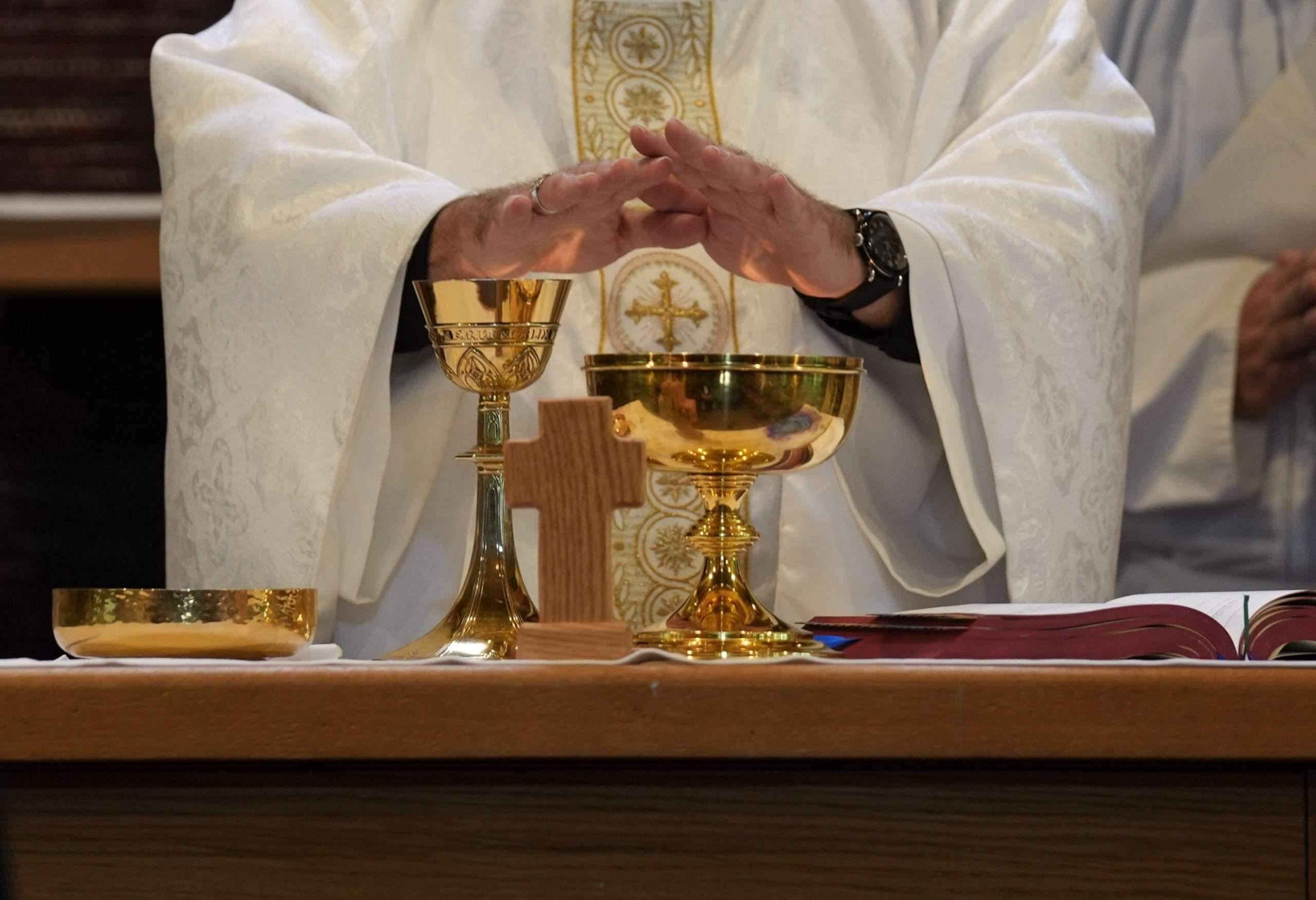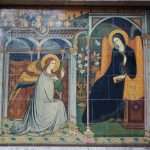Bishop Juan Hervas, a founder of the Cursillo Movement, said one significant thing weakening the Catholic Church today is a minimalist interpretation of the Gospel: It asks from people less than Jesus asks and offers to people less than Jesus offers. That’s not the Gospel. Jesus isn’t offering several optional levels of Catholicism. Jesus says those who love father, mother, son, or daughter more than Him are not worthy of Him (Mt 10:37). Many people today are tied to deep emotional relationships with family members, which is normal. But when family members want us to affirm their sin, many Catholic parents say, “I value this relationship more than fidelity to the Lord.” They don’t use these words, but that’s what they are saying when they don’t lovingly but firmly speak the truth to their children.
We toss around the phrase “missionary disciples.” What happens when a new favorite phrase comes into the Church’s vocabulary? It’s common for priests to come into the parish and say, “We’re all missionary disciples!” No, we’re not! Do you realize how radical it is to be a disciple of Jesus?
We shouldn’t sell lay people short. The baptized are called to participate fully in Jesus’ mission. Most people think being Catholic means saying your prayers at night, not killing anybody, and going to church occasionally. Those are good, but they aren’t discipleship.
The American bishops are spending $28 million to promote Eucharistic revival—but you can’t buy a revival. A revival requires repentance—humbling yourself before God and saying, “Lord, we’ve departed from You. We haven’t obeyed You. We haven’t listened to your Word or put You first. We’ve been negligent shepherds and people. We haven’t corrected error. We’ve let poison spread.”
We need a revival of the Sacrament of Reconciliation, but first, we need a revival of the understanding of sin. Who’s going to repent if they don’t think they’re sinning? So many people today don’t understand what sin is.
I recently read Paul and the Economy of Salvation by well-known biblical scholar Fr. Brendan Byrne. Fr. Byrne shows how Paul’s epistles are written in light of the Lord’s return and the final judgment. The subtitle of the book is Reading from the Perspective of the Last Judgment. Yet we hardly hear about the last judgment. That’s one reason the Church’s main mission of salvation has collapsed, while its concerns for this world have grown. If there aren’t consequences to sin, if everyone gets a trophy in the end—views our culture increasingly embraces—why bother to pray, fast, and evangelize for the salvation of souls?
Renewal Ministries’ goal is just to be Catholics—but that’s more radical than you may think. It means being charismatic, evangelistic, holy, in communion with the wider Church, Eucharistic, Marian, and contemplative. That’s our mission. Just to be Catholics. We want to embrace the full deposit of faith. We want to receive everything God has given to us—and help other people do it too.
The Church faces a serious situation today, and concerned, active Catholics are troubled by cardinals contradicting cardinals, bishops contradicting bishops, and whole bishops’ conferences, like Germany, calling for blessing same-sex marriages, ordaining women, and basically accommodating to the culture.
The Church in Germany says the clergy sex abuse scandal was so hurtful, we must regain credibility by accommodating to the culture’s understanding of sexuality. It allows its employees to be in same-sex relationships and blesses same-sex relationships in some dioceses. The German Church leads the way going over the edge in part due to decades of very skeptical scripture scholarship. Without belief in the Word of God, we are susceptible to reducing the Church’s mission to this-worldly goals.
The undermining of Scripture is a fundamental reason why this is happening. One thing we must do—something key to our own lives at Renewal Ministries—is recover our confidence in the inspiration and authority of Sacred Scripture. The Constitution on Sacred Revelation from Vatican II says God is the primary author of Sacred Scripture. While He works through the human authors and their mentalities and culture, what He inspires them to assert is indeed asserted by God Himself:
Everything asserted by the inspired authors or sacred writers must be held to be asserted by the Holy Spirit . . . as teaching solidly, faithfully, and without error that truth which God wanted put into the sacred writings for the sake of salvation. (Dei verbum 11)
As St. Paul says, Sacred Scripture is not just a human word, but the Word of God (1 Thes 2:13). Our salvation depends on hearing, believing, and obeying the Word of God. The salvation of everybody we care about depends on believing what God reveals to us about who we human beings are, why He created us, and what we must do to be saved. That’s why we need to remind people about the status of Sacred Scripture in all our ministries, conversations, families, and countries.
We also must get clear about marriage and sexuality—which compose the point of the spear that the culture is using against the heart of the Church. If we lose clarity about our God-given identities, we’re going to wander around in massive confusion, being tossed about by every powerful political pressure. God created us male and female for the purpose of coming together in marriage open to life—that’s it. Every exercise of genital sexuality outside of holy marriage offends the Lord and damages people. It darkens our minds, destroys our bodies, and confuses our psyches. That means—it’s hard to say, but we need to in the right situations—that masturbation, pornography, fornication, adultery, and homosexual activity are offensive to the Lord and hurt people. We hear about the plague of pornography in the Church today, even among Church leaders, and that will darken their minds and hearts. That will take away their zeal for proclaiming the truth. We need to recover the truth about sexuality and marriage. If Satan can destroy basic human identity, he can destroy families and wreck young people, like he’s doing right now.
California’s governor recently passed a law saying school boards can’t exclude LGBTQ material from schools. And in Finland and England, efforts are underway to prohibit people from saying things in the Bible. Underneath this lies a guilty conscience—people want us to condone their actions. But even natural law tells us that, despite temptations or inclinations some people may have, that’s not what we were created for.
Scripture tells us that when people commit sins, they often try to encourage others to do the same (Rom 1:32). People who have rebelled want other people to rebel. People who have given themselves over to the darkness want other people to give themselves over to the darkness so that no one can say there’s anything wrong with their actions. They’re trying to seal themselves off from any correction and their only hope—Jesus!
Paul talks about things that need to happen before the Lord returns (2 Thes 3-12). The first is a great apostasy. Apostasy isn’t something pagans do; it’s something Christians do. It’s a turning away from the faith on the part of those who once had it—which is happening now.
A new US study rephrased the question about whether Catholics believe in the Real Presence, and two-thirds of people really do believe in it. However, the Eucharistic Revival campaign grew out of a study that said two-thirds of people didn’t believe in it. It depends on how you ask the question, but it also showed that only seventeen percent of US Catholics attend Mass weekly. Whatever the state of belief in the real presence of the Eucharist is, the state of obedience is very low. Faith isn’t just believing the truths of the faith; it’s obeying the one who speaks these truths and doing the works of faith. Faith without works is dead.
“Jesus became the source of salvation for those who obey him” (Heb 5:9). Obedience is not popular, but we need to obey Jesus and his Word.
Amid this great apostasy, there are bright spots. The Lord is cultivating a remnant—a relatively small, but still significant, number of people alive in the Lord and committed to following Him. May we all echo the song When the Saints Go Marching In: “Lord, I want to be in that number!”
Paul also says that before the Lord comes, what is restraining evil will be removed (2 Thes 6-7). What is left to restrain evil? Western culture has experienced a systematic attempt to remove any restraint on evil through abortion, euthanasia, the transgender movement, and many other things. Silencing people. Taking away religious freedom. Taking away respect for evidence, logic, and reason. Who would have guessed that the Catholic Church would emerge as one of the strongest defenders of logic, reason, and evidence?
When nations turn away from God, the punishment is awful. People become slaves to sin. Their minds are darkened.
Second Thessalonians 2:10 says some people are “destined to perish because they refused to love the truth and so be saved.” When the Word of God pierces your heart and mind, it’s very serious to pretend it didn’t happen, bury it, or turn away from it. Scripture says, “To him who has will more be given, and he will have abundance; but from him who has not, even what he has will be taken away” (Mt 13:12). That’s the truth about union with God, knowledge of God, and salvation. If we don’t keep saying yes to the Lord as He unfolds his revelation to us, we may be plunged into darkness as punishment for refusing to love the truth and open our hearts to the light (Mt 13:14-15).
Nevertheless, we should always hope, pray, and sacrifice for people’s salvation; never give up on them. In recent years, I’ve been profoundly struck by the Fatima apparitions. Mary showed the three elementary-age children a vision of hell. She thought it would help these young children, who were being called to a mission of salvation, to know that something is really at stake. There are consequences to believing and obeying and not believing and not obeying. Afterward, those children were totally concerned about the salvation of souls, particularly St. Jacinta. Almost daily, she asked, “Have you offered some sacrifice for the salvation of souls?” Mary herself said, “So many souls are going to hell, because so few people are offering prayer and sacrifices for them.” If Mary was teaching today’s children the same things she taught the Fatima children, many religious education programs would immediately fire her. Wow—that is worth contemplating.
Mary also said, “Pray the rosary every day for world peace, because the world is in danger.” Guess what? The world is still in danger. What’s the solution? Keep our eyes on Jesus. Obey Him. Pay attention to the prophetic warnings and reminders He is giving us through Mary. He will never abandon us.
We must stop editing the Gospel. We must stop omitting in our preaching, teaching, and conversations those parts that are disturbing—because they’re supposed to be disturbing. They’re supposed to disturb us into repentance, holiness, and mission. Calls for the New Evangelization won’t be met with enthusiasm unless people believe something’s at stake. If God is so merciful that everybody’s going to be saved, why bother? God is merciful, but even in the Divine Mercy devotions, Jesus told St. Faustina—nobody talks about this—that “many people are perishing because they’re not availing themselves of my mercy. Tell people about my mercy because the Day of my Judgment is drawing near!”
This letter originally appeared in Renewal Ministries’ January 2024 newsletter. The content is condensed from a talk Ralph gave in October 2023.
Photo credit: Maria Khym








0 Comments